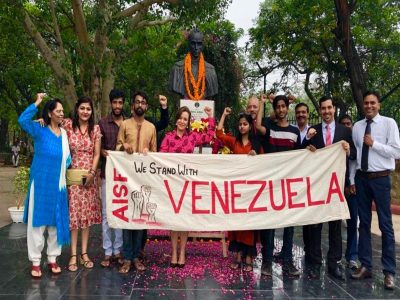At the center of persistent sexual violence and uncomfortable stares, the queer community in Delhi continues to be enmeshed in a wrestle with the society for basic human dignity and privacy.
According to the latest data released by the National Crime Records Bureau (NCRB), the country registered no cases of rape or sexual violence against the trans community. However, people who belong to the community paint a darker picture of reality.
From facing sexual persecution to having to “prove” their gender at various security checkpoints in public places – the sexually marginalised community continues to face discrimination and violence in Delhi.
Surviving brutalities
Thirty-one-year-old Reshma (name changed to protect identity) works as an assistant to a roti-seller at Connaught Place from afternoon to evening and a sex worker at night to survive the expenses in Delhi.
“We are not accepted in regular offices and not all of us are well educated or privileged to be employees at safe government places, so we have to work off jobs to make a living,” she says, clad in her “favourite” purple salwar-kameez.
Hailing from Hapur in Uttar Pradesh, Reshma moved to the Capital when she was 20 and has survived unspeakable atrocities in over a decade. Some left her body and mind with indelible scars. “Living as a visibly trans person comes with a cost. Every day is a day of fear. In my initial years, violence was shocking, but over the years, I got used to and prepared myself better. I befriended empathetic people and my inner circle is safer,” she says.
During her work at the roti shop, she has been the butt of queerphobic jokes and faced unwanted sexual advances while handing out food to customers. “People openly molest and giggle with no consequences,” she says.
As a sex worker, she has incurred a lot of losses due to non-payment. “They don’t respect cis-women sex workers, we are far off. Recently, one man picked me up in his car. He looked well-off. As we proceeded towards Patel Nagar, he demanded sexual favours in his vehicle that were not included in the package. But I obliged by asking for a raise in payment. Upon reaching his house, I was subjected to sexual humiliation and violence,” she recalls.
That night, Reshma was beaten with rods and had to return home on her own with sprained knees with no payment. “I couldn’t work for a week. I did lodge a complaint, but there was further humiliation at the police station,” she says.
“Pehle toh hamein hi criminal banate the, par abhi at least complaint lete hai (Earlier they used to frame us with criminal charges, but now at least they lodge our complaints) But still how many of our complaints are taken seriously, which is also why we hardly report,” Reshma says, talking about striking down section 377.
Trans victimisation
“Queer, trans and gender non-conforming communities are routinely targeted for violence both by the police and state agencies and by passersby and this is especially true for people who are forced to work on the streets for their living, whether it is sex workers or those who do ‘badhai to mangti’ or traditional forms of begging,” says Professor and social activist Bittu K.
“Recently, family members of queer people at a government shelter home in Delhi were brutalized. Half of these violent incidents are done by their families, especially on trans men. Every queer person experiences some kind of violence within the four walls of their homes and is pressured to live in their assigned gender. In the worst cases, they are subjugated to actual violence when they don’t conform,” he says.
In light of personal experiences, the professor continues, “Stepping outside of my home, the challenges I faced in Delhi, for me passing as a cis-man some of the times, the threat of violence is greatly reduced. For anybody, even myself, when I did not pass as a cis-man, there were immense challenges. Trans children are catcalled and yelled at with transphobic slurs all the time.”
“The trans community is assaulted even within their homes by delivery persons. There have been several such incidents of assault and that’s just a measure of the last few months. So, there is a very high-level insecurity in living in Delhi as a trans man. Forget about outside of home – these are things that happen in your home by strangers. The entire delivery economy is dependent on people coming inside your homes, so even in that context, visibly queer and trans people are not safe,” he says.
“Besides, crimes against trans children frequently go unreported,” he adds.
Travelling in public transport is menacing for the community for all the sexual advances and male gaze they have to bear. “If visibly trans people are out in public spaces, even if they are in groups, they are asked outrageous questions like ‘kitna legi’ (how much will you charge?) really often,” says Sumiran Kabir.
No entry for visibly queer
Kabir has often faced a “no entry” to their face when they are out socializing as a visibly queer person. “There have been clubs in South Delhi that have brazenly denied us entry into their posh spaces. Once I went to one of these places with my partner for a couple’s night and was asked to leave. The guard, who I am sure was following instructions, told us that entry is for ‘only real couples’,” they say.
Artist and educator, Kabir at times restricts their identity when they don’t have the mental bandwidth to put up a fight against such humiliation and rather wears “something that is gender conforming”.
“Visibly queer people are harassed countless number of times because of their sartorial choices in public transport. When I am not willing to take it, I just wear plain Kurta pajama. However, this is stressful for us. I am still privileged so I cannot imagine what those who don’t share my privilege go through,” they say.
Auto drivers often reject them as passengers in their face “be it all this Uber, ola or regular ones”.
“I don’t understand why they do this. Do they fear some kind of consequence when they come to pick us up? I know it stems from queerphobia, but there is also more to it. Like, so many times, my uber arrived at my pick-up location and cancelled after saying stuff like ‘aapka toh kuch alag hi naam aa raha tha app mein (you name showed different on the app) when they see me, a visibly dressed queer person,” the 35-year-old says.
Once, Kabir was assaulted at a plush club in South Delhi for “gender territorial reasons”.
Twenty-seven-year-old Lasya Kahli Singh was shunted out of the salon, where she had gone to thread her eyebrows in Delhi.
“I had to do my eyebrows, so I went there. When I entered, it wasn’t a problem until they understood that I am a trans woman. As I sat down and the woman who was attending me came close to my face to do my threading, suddenly flinched and said that she can’t because I am a man? Eventually I had to leave the salon to avoid any further confrontation,” Singh, an artist, says.
Scant spaces, rare visibility
The queer community collectively feels the palpable lack of visibility in public forum and dearth of spaces or them.
“You see, even in metros, we either have to pass through the male or the ladies checkout and face the jeers and uncomfortable questions from security staff during frisking. Why is there no sensitization of these personnel from the administration’s part? Besides, why aren’t there spaces for us separately so that we don’t have to restrict and force ourselves into clothes and identities that suffocate us? There has to be more inclusivity also,” says Kabir.
If a visibly queer person manages to clear security check without humiliation, they are harassed inside metro coaches. “Why isn’t there a coach for our safety like that of cis-women,” they ask.
Besides public transport, the queer community is fighting a battle to find more representatives in public offices and educational institutes for a better gender sensitization model.
“I would feel much safer if I walk into a mall or a bank and find visibly queer staff. It also normalizes us and tells the society that we exist,” says Lasya.
“You see, even in schools, there is so much that needs to be changed such as the syllabus. There is absolutely no mention of us. The only reference is that of Hijras, who are also only reduced to guards whereas they were artists themselves,” Kabir says.
Visibility creates a crucial sense of individual belonging and security for LGBTQ+ and that remains a fight for the community and they can only be successful with institutional support.





